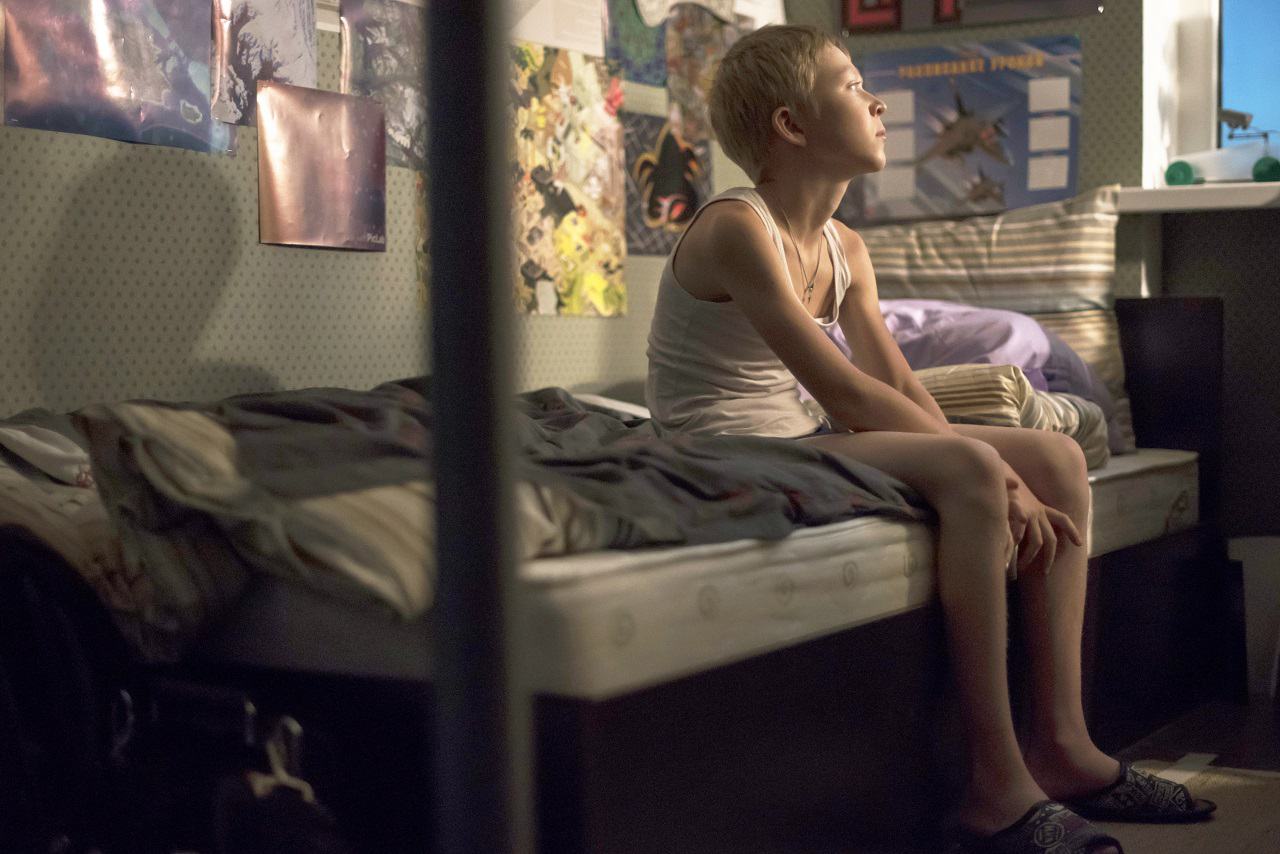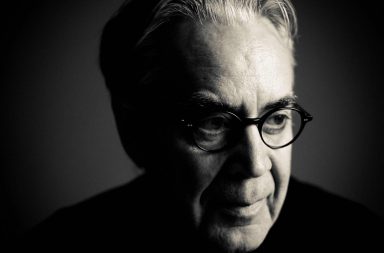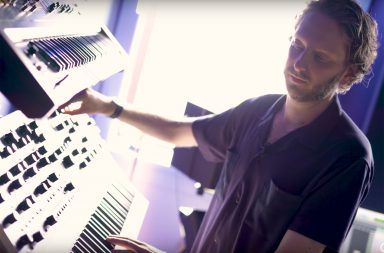Last year’s most heart-tearing cinematic gem came from Russia and was coldly called Loveless. The film, directed by Andrey Zvyaguintsev, follows a couple in the midst of obtaining a divorce when their only child Aliosha vanishes. Boris and Genia, the parents, will put all their efforts in the search for their 12-year-old son, with the help of the police and a group of volunteers.
Loveless features original music composed by Evgueni and Sacha Galperine. Born in Russia but based in Paris, the two brothers have been composing scores together since the late 2000s. Their experimental approach of film music often led them to working with young auteurs, but the Galperine brothers have also made their mark on biggest film and TV productions such as The Family, the French political drama Baron Noir and Barry Levinson’s latest two films, produced by HBO: The Wizard of Lies and the upcoming Paterno.
Unanimously praised by film critics all around the world, Loveless has been awarded with a number of accolades, including the Jury Prize at the 2017 Cannes Film Festival, a César for Best Foreign Film and both an Oscar nomination and a Golden Globe nomination for Best Foreign Language Film. The film’s minimalist, personal score also earned Evgueni and Sacha Galperine a nomination for Best Composer at the European Film Awards, which they eventually won. The soundtrack album has been released by Varèse Sarabande on November 10, 2017; co-produced by Evgueni Galperine and Andrey Zvyaguintsev, it features the music from the film as well as new material that was recorded but not used in Loveless.

How did you end up composing the score for Loveless?
I met Andrey Zvyaguintsev once. We got on well but did not stay in touch. I knew he had listened to the music Sacha and I do, so when I learned that he was shooting a new film, I texted him, saying I had just finished to compose music for a radio program based on a script written by Andrey Tarkovsky which he never had the chance to direct, so it seemed quite logical to pursue this work with him. Zvyaguintsev rarely works with composers, he usually uses pre-recorded material, so when he answered my message, he said that the score had to bring something very personal, something that completes the film without exaggerating the on-screen emotions. So if I wanted to write music for the film, I would have do it without any images, without any script; I would only rely on the storyline told by Andrey. There was a huge risk, but most of the time, risky things are for the better. This was also at a time when I wanted to write personal music, in the sense that I wanted to compose for myself, so Loveless was perfect for me. I could compose for myself since I was not restricted by images but at the same time, it was challenging to work on a film made by a director I admire. Two birds with one stone, as the saying goes.
We usually hear composers talking about directors as very close collaborators, but in the case of Zvyaguintsev, it seems quite different.
It was. This is not how Andrey works at all. He wanted the music to enter and reveal something. It might be a miracle, at least I like to think it was, but for three months, we only discussed through text messages and he did not give me any indications. So, after three months, he asked me to join him in Moscow because he had tried everything with music, but he thought our compositions were the best match for the film. I was amazed because we did not even need to revise anything, except for a few little things. The fact that it was a very personal composition developed, in my opinion, a stronger emotional connection to Andrey’s story. On the opposite, when you compose in front of the images, it restrains your creativity. I love cinema and film scoring, but having so much freedom in order to serve the film is something wonderful. Of course, it cannot apply to many directors: Andrey is one of them and there may be some others. We have just finished a Barry Levinson film with Al Pacino on which we tried, to a lesser extent, to recreate this: we composed half of the film’s music with no images, and the other half with them. It is very stimulating because even if you are not using everything you have written in the end, the process gives you freedom in the research phase; this is interesting, and if it does not work, you can still land on your feet by composing in front of the images.
This could be the most interesting aspect of the Loveless score: how the emotions are distilled and how you find a way to express these abstract feelings.
I think it could not have been said any better: it is both emotive and abstract. On the emotional level, we just wanted to translate this feeling of anxiety, the obstinate search that we wanted to put in music. For the piece called “11 Cycles of E” the idea was to express with music what was going on inside the mind of these two parents who have lost their child. The divorce, selling their apartment, this kid that nobody wants to keep, all of these things suddenly become only one thing: finding him at all costs, and nothing else matters. I thought it would be amusing to translate this determination using only one chord and one rhythm, and make it sound interesting, which would not be an easy task. Of course, when the cue is developed, the original principle is kind of betrayed, but the basis is still there. When I composed “Trouble” I recorded the sound of a squeaking bicycle wheel in order to create a feeling of discomfort. This sound is disturbing and it is part of these cold, menacing landscapes; as an inspiration, I took Zvyaguintsev’s previous films which are all aesthetically beautiful but extremely cold. The idea, which is close to us and to the director, was to do something that would be minimalist and to develop a metaphysical language. I know it sounds silly, but this abstraction is also the idea that we cannot define the musical codes, everything is all shook up. It immerses the viewer in a world he doesn’t know and it invites him to play by rules he doesn’t know. At the end of the day, the film is not comfortable at all, it requires the viewer’s participation to understand what is said but not shown, which is how wonderful their life would have been if they had just loved their child. Often in his films, the music is the link connecting an infinitely small story to the universe.
Here, Zvyaguintsev also leaves behind the symbolism he used in his previous films, which was very heavily featured in Leviathan. Loveless is much more rooted in the actual world.
Well, yes and no. The symbolism is indeed less obvious than it was in Leviathan, where it was very heavy, but there are symbols all over the film. This search in the forest, in abandoned buildings… It is no accident that the only place where the kid feels at home is this abandoned house he uses for hiding. The desperate search is also that of the parents who, just like their son, are lost. There’s a parallel between their desperate search for him and the desperate search for themselves. It is for the same reason that the new families they have built have not brought any happiness to them. There is another interpretation, harder to identify when you’re not a Russian: the film is about a couple who is divorcing, but it is also about the divorce of Ukraine and Russia. It is daintily shown, but the film is quite critical of these characters who watch this documentary – most people don’t know it, but the documentary is fake – but who actually don’t care: she’s on her phone, she steps out on the balcony, practicing sports as if nothing were happening… They are not the least concerned with the world that surrounds them, and in so doing, they are not concerned with themselves at all. Those who lived without love are hurt and they will never be able to give love in the future. They are connected through their phones, their Facebook, but actually, they are completely cut off from the world by being trapped in life stereotypes that are not what they actually are. The symbolism is kind of hidden here, I think it is, so far, his film that is the most rooted in the actual world, but it might be his most positive as well. The presence of the Liza Alert Foundation, an actual nonprofit group of volunteers who search for missing children, is very positive. They fight freely for the lives of children, and there was no positive entity such as this one in the previous Zvyaguintsev films.
How did you decide which instruments you were going to use?
We did not choose the instruments together, I made propositions. As I was saying earlier, the idea was to cover our tracks and use instruments, or at least mix them, in a way that would not be too obvious. We have superimposed several layers of strings to have them sound as if they were played in reverse – they are not. We used a prepared piano, as it is the case with “11 Cycles” which has a sound that is not so much known; sometimes, we have used my own prepared piano, and some other times, it is mixed with other instruments. In “11 Cycles”, I used a sample of it that helped me work with the sound so I could only have the noise made by the keys, and then the note appears progressively. When you are willing to create minimalist music by playing only one chord and one rhythm, there has to be a variation, otherwise it would be extremely painful. You can vary the dynamics, but you can also vary the timbre. It was really exciting to play on this because you have pure noise on one side, the piano note on the other side and in between, there is a whole world interesting enough to explore. There are also orchestral sounds in the score, but they are always played in a way you could never play live: there’s plenty of different layers and rhythms in “11 Cycles” that you would never recreate with actual musicians. There are also some classical choral strings used in a modern way in order to highlight the link that the film has with religion and the idea of the Eternal. These are the main timbres we have used in the score but anyway, the opening and ending theme which is “11 Cycles” was very important to Andrey. I can’t remember another director who asked not to switch the lights back on before the end of the credits because for him, it is not just the end credits theme: it is the end of the film itself. Despite the fact that there is very little scoring in the film, I think this one goes noticed enough because it is very integrated in it.
It is quite curious that the soundtrack album contains nine tracks, because there are only four of them used in the film.
There’s “11 Cycles,” “Drops and Iron Nails,” “Trouble,” “Aliosha” but in a slightly different version… There is a piece we have composed as an alternative to Arvo Pärt, but it was not used because Andrey was already too attached to Arvo Pärt… So, yes, I think this is it, even if there are two cues that are used twice. The only thing we regretted was that Andrey wanted to use a piece called “Snowstorm” but he couldn’t find where to put it. He tried it with several scenes but it takes a lot of space, and when we tried to reduce it we realized it was not interesting anymore, so we decided to keep it on the album anyway. Andrey loved the music so much that he decided to coproduce the album with me. I must say that when you write music for a film without images, you must of course expect that some of your pieces will not fit. Hopefully for us, the ratio was of 70% fitting the film or the album to 30% to be thrown away. Generally, it is rather the other way around.
What also defines the musical dimension of the film is the importance of real-life noises. The car, the doors… They are much more present than your score, but the film’s musicality is also based on that.
Absolutely. His foley recordist is a very talented guy and the way Zvyaguintsev approaches sound is very musical. There is a cue I have made, that plays when they go to the hiding place, which is basically sound design – by the way, they even overlayed it to Arvo Pärt so they could integrate it a bit more in the film. Anyway, the sound work is an entire character of the film’s soundtrack.
How do you and Sacha usually work? Does the division of labour depend on the project?
It is often according to our own envies and our skills. For instance, there is this film for which Sacha will know how to use the instruments better than I do, while I will be more comfortable with that one. There are also many projects on which we divide our work equally and for which we are physically together. We’re doing a political drama called Baron Noir that is 50/50 work and it is very simply divided according to who wants to do this scene or that one, in order to develop a particular feeling, an emotion, a desire, and if it does not work or if the producer does not like it, the other one will provide an alternative. We are constantly trying to surprise ourselves without being competitive. When we work on big productions like Luc Besson’s The Family, in which there was an orchestra, electronic music, programming, etc., we were together in the studio every day. We had no choice, there was a lot of work that had to be done fast. The big advantage of working together is that we can go faster: you have an idea, you play it and rather than sitting on it for the next couple of days, asking yourself whether it is good or not, you have somebody in front of you who is going to say instantly, “this is crap” or “this is great.” The drawback, on the other hand, is that you have to give your ideas a shot, work them for two or three days before considering definitely that they have some potential. As an example, Sacha, who is much slower than I am, was working on something I did absolutely not believe in, and after a week, he turned it into something brilliant. Time is an important factor because it has become the greatest luxury for a composer – and not only for composers. If you have time, you are not afraid to take wrong paths. In production schemes where you have to be fast – Desplat is an excellent example of a composer who knows how to be fast – most of the time you have to keep it simple, obvious and efficient. You can of course do this with taste and talent but it will never be much of a surprising score. What makes a score surprising is when you put your own personality in it or when you have time. You can tell when a composer has had time, whether it is because the director is more important or because the project is more exciting. You can tell it right from the start.
What you said about a metaphysical score is interesting…
It is ridiculous, isn’t it? (laughs) What I meant by “metaphysical” is trying to find connections between us and our world, and trying to find these connections within ourselves.
What I find interesting in this is precisely how, in this personal approach, you can identify a theme in a score, which seems less and less easy as time goes by.
It is and old argument, very interesting nonetheless, but there’s a very simple answer to that. At least I have one: cinema as we know it has changed. We do not make films like we used to some thirty years ago. I would take as an example superhero films, which have become much more realistic; actors, even the big names in Hollywood, minimize their acting. They are asked to be the most realistic they can because this is what they are looking for today. Tim Burton’s Batman is whimsical, it is great because it is highly inventive; now you have Christopher Nolan’s Batman, in which they explain the hero’s psychology, how he has lost his parents, how he has educated himself, how he has built himself, what codes allowed him to unlock his complexes. It is almost a real-life character! Even the fights, they used to be just a punch and ten guys blown away, but now they are realistic fights. With this in mind, thematic scores (so music based on themes), is something that is way too lyrical. If you do a Morricone-style theme today, it is hard to think of it in a film. In Three Billboards Outside Ebbing, Missouri, Burwell does a stylized job but there are only a few notes, there is no melody (melody in the sense of a John Williams or Alan Silvestri theme). Jurassic World uses the main theme from Jurassic Park but only keeps fragments of it, there is no room anymore for the original theme. Some films allow this but they are always fantastic films. John Williams composed a theme for the Harry Potter saga, Alexandre Desplat wrote a melodic theme for The Shape of Water, because it is a fantastic film. If the film is realist, forget it. It will come back someday, because everything comes back, even checked shirts (laughs)! Let’s not separate the elements here: a film score is part of the language of cinema, and cinema is part of the language of our time. We should always look at the links – whether they’re metaphysical or not – between things, and our society today is much less naive than it used to be. In the 80s, there was something that was loose, emotionally speaking, and completely explosive: Tina Turner, Michael Jackson… Today it is much more contained. Can you picture someone coming up the stage, yelling “YEAAAAH!”? Impossible. Why? Because we are at a time when people are looking for realism, we want to be closer to life as we know it. If you write down this answer, don’t forget the copyright (laughs).
Interview prepared, conducted, transcribed and translated by Valentin Maniglia
Edited by Marine Wong Kwok Chuen


